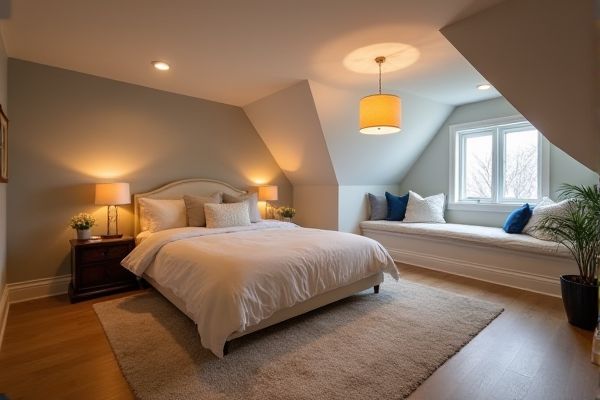
Attic recessed lighting offers a sleek, space-saving solution that provides even illumination without cluttering the ceiling, ideal for low-clearance areas. If you're considering the aesthetics and functionality of your attic lighting, explore the benefits and differences between recessed and pendant options in the rest of the article.
Table of Comparison
| Feature | Attic Recessed Lighting | Pendant Lighting |
|---|---|---|
| Installation Location | Installed flush into attic ceiling | Suspended from ceiling, usually below attic level |
| Space Efficiency | Maximizes headroom, saves space | Uses vertical space, may reduce headroom |
| Light Distribution | Even, widespread illumination | Focused, directional lighting |
| Aesthetic Appeal | Minimalist, hidden appearance | Decorative, visible fixture |
| Energy Efficiency | Typically LED, low energy use | Varies by bulb type, can be LED |
| Maintenance | Requires ceiling access, less frequent | Easy bulb replacement, accessible |
| Cost | Moderate installation and fixture cost | Varies widely; can be affordable to expensive |
| Best Use | Small attic spaces, task and ambient lighting | Accent lighting, style-focused spaces |
Introduction to Attic Lighting Solutions
Attic recessed lighting offers a sleek, unobtrusive design that maximizes headroom and evenly illuminates your space, making it ideal for low-clearance attics. Pendant lighting provides a decorative element with adjustable height options, creating focal points and adding character to finished attic rooms. Choosing between these attic lighting solutions depends on your attic's layout, ceiling height, and the ambiance you want to achieve.
Overview of Recessed Lighting for Attics
Recessed lighting in attics offers a sleek, space-saving solution that evenly distributes light without compromising headroom or comfort. These fixtures are ideal for low-ceiling attic spaces, providing a clean and modern look while enhancing visibility in dim or confined areas. With energy-efficient LED options and customizable trim designs, recessed lights can be tailored to highlight key attic features or create ambient illumination.
Benefits of Pendant Lighting in Attic Spaces
Pendant lighting in attic spaces offers focused illumination, enhancing both task performance and aesthetic appeal while saving valuable ceiling space. This type of lighting provides adjustable height options, allowing customization for sloped ceilings common in attics. Additionally, pendant lights add architectural interest and create a cozy ambiance, making attics more inviting and functional.
Energy Efficiency: Recessed vs. Pendant Lights
Recessed lighting in the attic typically offers greater energy efficiency due to its integrated LED options and direct light focus, reducing wasted illumination. Pendant lighting often consumes more energy because it uses larger bulbs and provides ambient light that may require higher wattage to adequately brighten the space. Choosing recessed lights can help you lower energy consumption and reduce utility costs while maintaining effective attic lighting.
Space Optimization: Low Ceilings and Fixture Choice
Attic recessed lighting maximizes space optimization by providing a sleek, flush-mounted option ideal for low ceilings, preventing any visual clutter or headroom obstruction. Pendant lighting, while stylish, can reduce usable ceiling height and may not suit compact attic spaces with limited clearance. Your choice should prioritize recessed fixtures for maintaining open space and functional lighting in confined attic environments.
Aesthetic Impact: Ambiance and Style Considerations
Attic recessed lighting offers a sleek, unobtrusive aesthetic that enhances ambiance with soft, evenly distributed illumination, ideal for creating a spacious and modern feel. Pendant lighting introduces a bold design element, providing focused light and a visually striking centerpiece that adds character and warmth to your attic space. Your choice between the two will shape the overall style, balancing subtlety with decorative impact to suit your attic's function and design preferences.
Installation Complexity and Maintenance Needs
Attic recessed lighting offers a sleek, space-saving solution with relatively straightforward installation in existing ceiling joists, ideal for low-clearance areas, while pendant lighting requires more complex wiring and ceiling support due to its hanging design. Maintenance for recessed lights is minimal, often limited to bulb replacement and occasional cleaning, whereas pendant lights demand more frequent dusting and potential adjustments to cords or fixtures. You should consider your attic's ceiling structure and accessibility when choosing between the low-profile, low-maintenance recessed lighting and the decorative, higher-maintenance pendant lighting.
Cost Comparison: Upfront and Long-Term
Attic recessed lighting generally has higher upfront costs due to installation complexity and the need for professional wiring, but offers energy-efficient LED options that reduce long-term electricity expenses. Pendant lighting typically costs less initially and is easier to install, though bulb replacement and higher wattage options can increase your operating costs over time. Considering both installation and maintenance expenses helps determine which lighting solution aligns best with your attic's budget and energy goals.
Safety Concerns in Attic Lighting Installations
Attic recessed lighting offers enhanced safety by being flush-mounted, reducing the risk of exposed bulbs causing fires or heat buildup near insulation. Pendant lighting in attics can pose increased hazards due to hanging fixtures that may interfere with limited attic space and present burn risks or accidental damage. Proper insulation contact ratings (IC-rated) and adherence to electrical codes are crucial for safe attic lighting installations, especially with recessed fixtures.
Choosing the Right Lighting for Your Attic Needs
Attic recessed lighting offers a sleek, space-saving solution ideal for low ceilings and can evenly illuminate the entire area without obstructing headroom. Pendant lighting, while adding a decorative element, suits attics with higher ceilings and provides focused task lighting or ambient warmth. Selecting the right lighting depends on attic ceiling height, desired ambiance, and functional requirements such as workspaces or storage areas.
 homyna.com
homyna.com